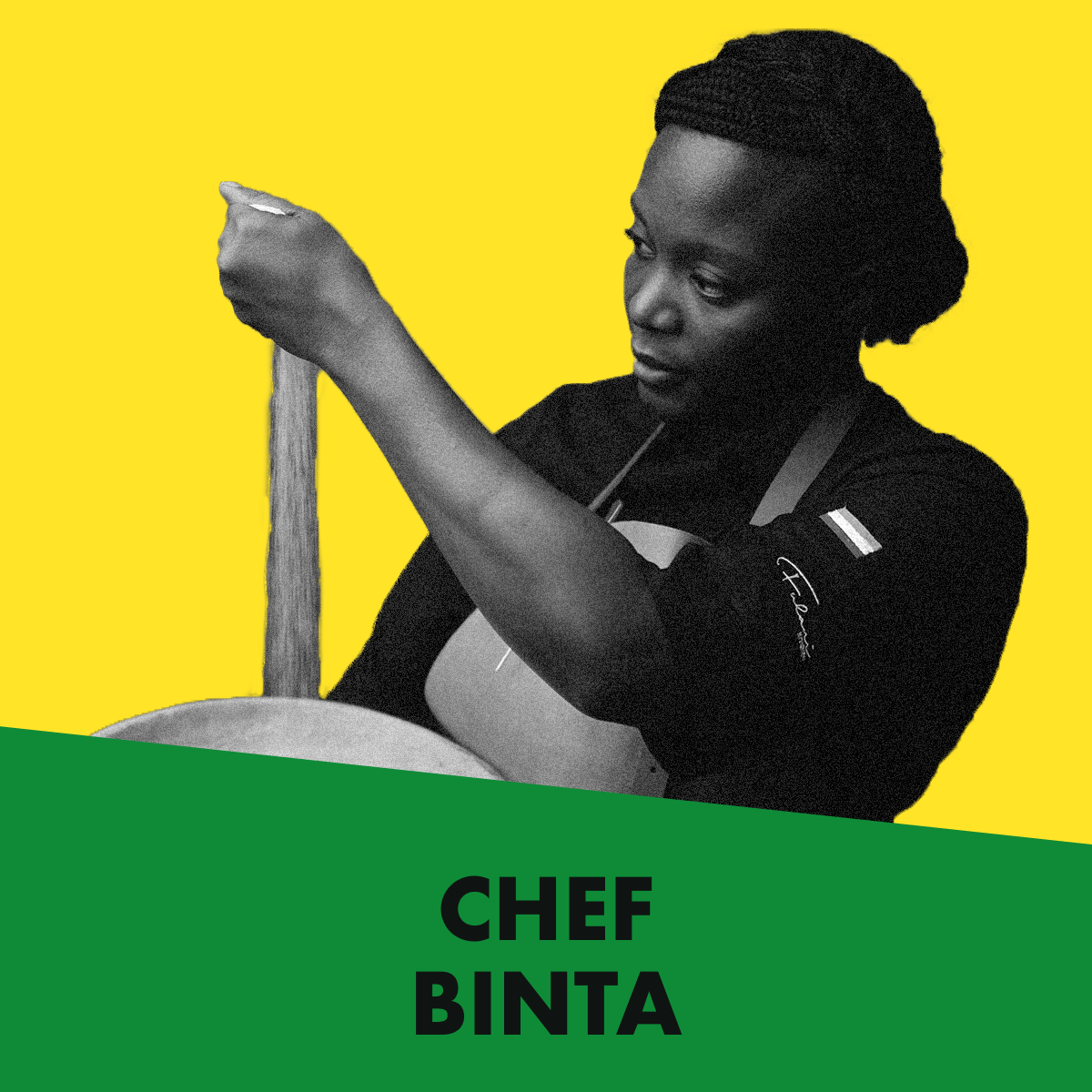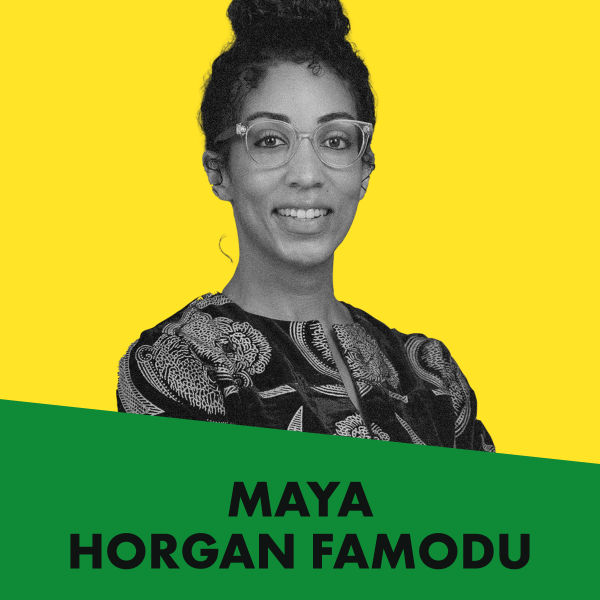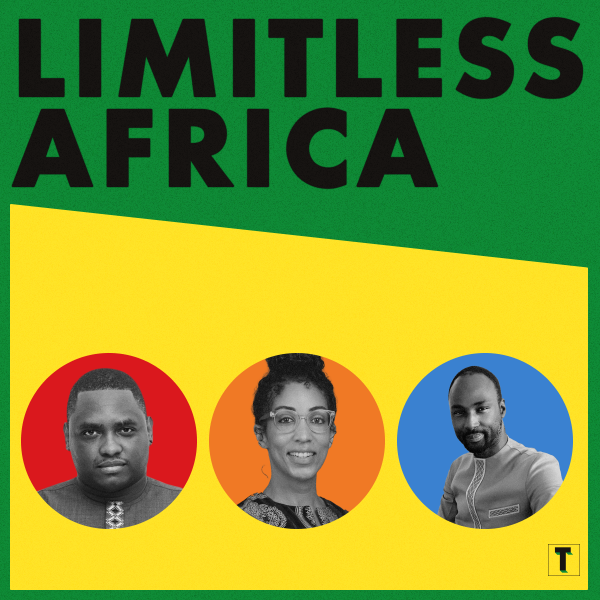"We are way more than Jollof"
With guests Chef Binta

Episode notes
How can we get more people enjoying Africa cuisine?
Transcript
Chef Fatmata Binta is a Sierra Leonean cook based in Accra, Ghana.
She promotes and preserves culture through food. Her ‘Dine on a Mat’ experience, where she immerses guests in the full Fulani dining experience, won her the prestigious Basque Culinary World Prize in 2022. It’s a great way to learn about the Fulani, the largest nomadic ethnic group in the world, They have a wonderful culture that is worth celebrating and preserving.
Chef Binta has also set up the Fulani Kitchen Foundation for women and girls. The organisat...
Chef Fatmata Binta is a Sierra Leonean cook based in Accra, Ghana.
She promotes and preserves culture through food. Her ‘Dine on a Mat’ experience, where she immerses guests in the full Fulani dining experience, won her the prestigious Basque Culinary World Prize in 2022. It’s a great way to learn about the Fulani, the largest nomadic ethnic group in the world, They have a wonderful culture that is worth celebrating and preserving.
Chef Binta has also set up the Fulani Kitchen Foundation for women and girls. The organisation promotes the farming of fonio, an ancient african grain, among rural women.
Fonio is an incredible grain. It has been feeding families in West Africa for over 5,000 years. It is suited to the Sahel region because it is resistant to drought and can grow in poor quality soil. It can be harvested quickly – after only 6 to 8 weeks.
Not only that, but it’s a great source of protein, fiber, iron, zinc, calcium and even Vitamin C. It fell out of favour because it is difficult to grow on a commercial scale.
Our journalist Abigail Musherure spoke to Chef Binta. I love her story. She grew up in a nomadic family in the Sahel and that really shaped how she sees food and sustainability. The way she describes some of the fulani delicacies just makes me hungry!
Here’s their conversation.
***
Chef Binta
So I’m Fatmata Binta I’m originally from Sierra Leone, based in Accra, Ghana. I’m very
passionate about African gastronomy. I’m a chef, and a food systems advocate. And I also
consider myself a cultural ambassador. So what I do I promote food, I champion issues I care about, like food security, cultural heritage, I love to promote culture through food. And I use my nomadic experience, which is the Dine On A Mat concept, to actually promote and preserve
culture through food. So in a nutshell, that’s Chef Binta.
Abigail
Thank you, the first question we have is what’s the meal that reminds you most of home and if you could just give us a memory that’s attached with that?
Chef Binta
It’s something called Chorbal, it’s actually not an everyday meal. It’s a very ceremonious dish. So usually they only serve it when in the Fulani culture, the moment you’re seven years old, you start learning the Holy Quran, and you graduate as you go. So the reason why that particular dish reminds me so much of home and my childhood and my fondest memories, is because whenever a kid is graduating, they will bring the entire family together to cook that meal. And usually it’s like a snack. So they’ll soak rice, and then they’ll pound it to add honey to it or sugar.
And the reason why I like that dish, and also reminds me of so much, you know, fond memories is because when they serve the dish they gather all the kids together, and then they will throw assorted candies, and it’s always a competition for us to fight and who gets the most candies would actually get a special dish like the Jollof the Ghanaian style jollof. So it was so much fun, you know, fighting with your cousins and just grabbing candies and feeling so you know, good about it. It reminds me so much of home and it’s a snack that is so dear to me.
Abigail
Did you ever learn how to make that snack and would you say that it has influenced the cuisine that you make now?
Chef Binta
Absolutely, as a Fulani girl, cooking was a part of, you know, the things they teach you when
you’re going up because they always preparing you, for your husband, you know, prepare you for life, for all the things you’re going to face to be self sustainable. So I know how to cook all the dishes growing up. So it’s a snack, actually that’s on my menu now. That we did a fusion with because sometimes when you’re serving an authentic dish if you don’t fuse it, or if you don’t add your own interpretation as a chef, it’s hard to actually promote it to a different palate. So it’s on my menu and it’s paired with Bao Bao Parfait which is ice cream, and then hibiscus syrup, and then coconut mouse, and also candied ginger. It’s the best seller on our menu. I have tried so hard to take that dish off the menu, and people still keep asking for it.
Abigail
Okay, great. So, just for those who don’t know who in our audience, would you describe what
Fulani is?
Chef Binta
Fulani is the largest nomadic tribe in the world. I was about to say Africa but actually in the
world. We are across western Central Africa. We are nomadic people. We are cattle herders.
That’s what most people know us for. But we are more than that. Absolutely. We were always on the move. So you find us everywhere in Africa. We live very sustainably, everything is so sustainable to the point even our homes, we carry it along. So we can dismantle our homes, move from one place to another and actually build it. And you have three types of Fulani. You have the nomadic Fulani families who are constantly on the go by season because they go where the cattle can graze. So if they graze this town and there is not much they need more they can move to the next place. So they’re always constantly on the go. And they have this semi nomadic which they stay while at least for like a year or two and then they move and they have the residents Fulani, which I now fall into that box because I’m in one, you know, I settled in Ghana. So these are the ones that have settled in different places, especially in Sierra Leone. You’ll find a lot of them and in Guinea also where my family’s from. So Fulani is the largest nomadic tribe in the world and they are very sustainably driven, and they live and breathe sustainability, it’s more than a buzzword to them. Sustainability is a lifestyle to the Fulani people.
Abigail
Amazing you also talked a little bit about Jollof and just you know foods like that that are actually quite well known internationally. How would you say that you get the foods like Jollof, maybe foods like fufu back into an international sphere getting more than just that people from that culture to know it but everyone else.
Chef Binta
I think it’s a dish that is a conversation starter. Especially if you say African cuisine. Most people, the first thing they will say it’s either jollof, or they will talk about the Ethiopian injera. So it’s a conversation starter. And I believe also, we have so much more. That’s the fact we have so much more in Africa. We are way more than Jollof. But it’s a good thing that it’s the one thing that always starts conversation around African gastronomy. You know the Jollof battle also differently, while everyone is claiming to have the best Jollof. We all know it originated from Senegal, they have the best Jollof. But it’s a good thing because it creates that, you know, conversation where you get to share more with people about African gastronomy. And also you learn from other people, because one thing I noticed about food, just the fact that I’ve been, you know, I’ve been a chef, I’m also a foodie before a chef, and I’ve travelled a lot across Africa, also documenting and learning about our culinary techniques, our food systems, you know, especially in the junior school systems. One thing is clear is that we share so much more than we are different and it doesn’t matter the ethnicity, your background, or where you’re from every time when I host people on the Mat, they could come from Japan or or, or South Korea or something that will always say Oh, this dish reminds me with my grandmother, or something. And that’s, that’s so powerful. It shows that food is bridge, that actually connects us.
Abigail
Exciting I love that. And I was curious if you could just tell us about how all of this ties in with the Fulani Kitchen Foundation and why founding that was so important to you?
Chef Binta
It was very important, because I spent a lot of time travelling across Africa. I studied first in
Kenya, I studied culinary arts actually in Nairobi, Kenya. I lived there for two years, and then worked in a hotel in Ghana. And also there was this, this urge to learn about my cuisine deeper, because some of the questions I was asking myself, when I was in culinary school, when I was also working in restaurants and hotels, is that why is it that we’re not cooking, especially for me personally, I was asking myself, why is it that am I cooking the food I didn’t grew up eating. So it didn’t make much sense to me, there was no real connection or memories to what I was cooking. And I wanted to understand my cuisine better.
So I started travelling across Africa, I spent a lot of time in these rural communities with these women, you know, the gatekeepers, the custodians of gastronomy, in Africa. And, but most times, when you’re there, they give so much they take their time to teach you about all these ingredients, all these techniques, the food systems. And I go back to Accra, Ghana, and I host dinners inspired by these communities, I even step out of Africa and host dinners around the world. But while I’m in these villages, I’m always faced with the challenges these women are going into, it’s not something you can turn a blind eye to. It’s there. And it got to a point, it started kind of haunting me. Like I go in, I take inspiration I leave, I leave seeing the challenges, they are going through. And it didn’t feel right. I started feeling more like an extractor. And I didn’t want to feel like an extractor. So I wanted to collaborate with them in a more meaningful way beyond coming to take, you know, to document recipes, but also how can I collaborate with this woman in a in a more, you know, sustainable way. So and the COVID happened, which we all know, we were all forced to just pause. So when COVID happened, and I was also in a very unclear space, for lack of a better word, I was
just confused, because my concept is all about bringing people together to food in a communal way. And then when COVID happened, all of a sudden, we were talking about social distancing. So there was no space for my nomadic restaurant. There was no space. And I decided, okay, let me use this time to really dig deep and understand what can I contribute to, in these communities? So I started going back to the communities, you know, spending time with them on a day with no documentation, just spending time and that’s how Fulani Kitchen Foundation was born.
I was like, okay, I want to do something much more than just sharing food and telling
stories I want to champion things that are happening in these communities that I’m so
connected to my source code, these communities are my source. So that’s how I’m Fulani
Kitchen Foundation started. And the first thing we focused on was to build water wells, because this is one of the challenges to face, having clean water. And then also Fonio, which is a big part of my story, I actually experienced it as a child, who I am a war child, I was a refugee child, I grew up in Sierra Leone, and then the Civil War happened. And I was 11. I saw that. So. And that was a very transformative, profound phase of my life. Because I come from a very large family, like, very, very large family, I’m talking 1,000 cousins, or more, first cousins, or more. So I had to, we were forced to move out of Sierra Leone, and then went to our ancestral home. And this was a very small village that could only accommodate like 100 to 200 people. And yeah, we outnumbered the village, five times more. So. So then it was also hard to survive because we were a lot and then the food that was available couldn’t sustain us. So my grandmother, my Auntie’s, you know, just our family that was in the village, before we went to the village had to come up with solutions, you know, including our family like the aunties and uncles from Sierra Leone. So they started growing Fonio because the rice couldn’t sustain us like a 50 kg bag of rice could only last a day or two. So they had to like start thinking of ways to sustain the family. So we started growing Fonoi, everything was done from scratch. And the beauty about Fonoi is that when you saw you can have a list within eight to 12 weeks. So it was sustainable to fit the entire battalion. So we were prepared Fonoi morning, afternoon, evening launch breakfast dinner. So I learned so many ways before we had to be creative with it. So once the conversation started, about Fonio I wanted to add my voice to it because I have a first hand experience of it. How nutritious, how sustainability is is you know how it grows fast, it’s drought resistant, it can thrive in drought areas, you don’t need too much water to go it you don’t need to plough the land too much. And also the reason why I also care about indigenous food systems is because when I was in that village, the beauty of just doing everything in a minimalistic, sustainable way was very inspiring. I didn’t value it, then as a kid up until now,
when I look back, you know, to everything that was being done in the village, everything was
done from scratch, cooking, we had to go fetch our own firewood water, we had to fetch from
the stream, we had to grow our own food in the backyard and the farm. We had to compost, we learned how to use ashes from the fire to ferment things like the African locust bean. So it was very interesting. And as a kid, also, it’s exciting, because you don’t its tedious, unless when it’s, it’s like they say go wash, how many batches of dishes or something. So it was it was a very
profound phase in my life, and it shaped me as the chef I am today. So that’s why I value that so much today. So that’s how Fulani kitchen came about. And we recently in 2022, we we were we were honoured with the Basque Culinary World prize, which is a Nobel Prize for gastronomy. And most of, so the prize money actually, is how we started funding the project in a more structured way, we’ve invested in machinery in north of Ghana, where women are actually growing Fonio and these are the women have been, you know, engaging with for years. They’re like family now. So our next phase for that project is we recently just partnered with FAO Food and Agricultural Organization of the United Nations to help with scheme transfer training to help with access to markets for the women, also tackle some of the issues. That is the reason why Fonio is so tedious to process and the one of the reason why it hasn’t taken up, which is mechanization. So I’m really excited about that, and I look forward to seeing where this goes. It’s only up from here. I’m really excited. And I have a really great team based on support system on ground to actually push it.
Abigail
Do you have any US connections or something that could help bridge that with any kitchen
project to the US?
Chef Binta
So I’ve done projects in the US in 2019. I did a nomadic talk with the Fulani Kitchen in the United States. In 2019. I went on a tour. I did DC, New York. I took the nomadic experience there and it was it was very interesting. So I plan to come back again. I’ve also done I’ve also collaborated and festival festivals like the Charleston food and wine. I think I’ve been twice, and there’s more to come in the future. Let’s see. That’s why I’m a nomad. I go everywhere. There is no limitation. I’m all over. My goal is to share the experience. So take a piece of Africa and share it with the world and I cannot do it by just staying in Africa. So that’s why I like the concept that I can go anywhere and actually the kitchen reflecting the ways of the Fulani people by being on the go
Abigail
Amazing. Just another question that we’re curious about. How do you use the Fulani kitchen
foundation as a, you know, as a way to empower women. And you said that you were kind of
the gate bearers of the food so if you can just go a bit more into that?
Chef Binta
So it’s Fonio project one, one, empowering them with the right tools, because it’s a tedious thing to process. So investments in machinery, access to markets, partnerships with Food and Agricultural Organization, you know, it helps take that because also to do it alone, it’s not easy. So to have people who understand agriculture, you know who, that’s what their, their system is built around, It’s another way to actually help is this born from this woman. And also, we are currently building a culinary Heritage Village in Ghana, it’s three hours out of the city Accra. And the main goal is to preserve our indigenous food systems. So we are building huts actually, the nomadic huts where you come in, you spend a night you engage with the women we built the village in an existing village already, so you get to see firsthand the way of life of the Fulanis. So
you wake up in the morning you milk a cow, you make wagasi with the women which we are
also promoting so we are when the women do work as you want to promote it on the page. So whoever is in Accra wants local cheese, they know where to get it, we are connected them to the women making it we have things like Dawadawa because we have all the trees in on the land, all it says Baobao trees, to Africa locust bean trees, Moringa like all these things are there. So it’s a way to also promote you know, all this craftsmanship because they do all these baskets in the village just for livelihood. Our main goal is to create a space where women can try and support themselves and also the space is going to host international chefs and domestic chefs just to have that exchange and learn from each other.
Abigail
Amazing Thank you, my last question for you is what’s your dream or how do you imagine the Fulani Kitchen Project over the next five years or just a dream for its future?
Chef Binta
So right now for example, the Fonio project, the goal is to use that as a template and implement it across Africa, and different Fulani villages. That’s my dream. So I
want to use this as a template because I love indigenous food systems. I love rural communities and I want to see more of rural development around tourism. So my main goal and hope is to see Fulani Kitchen Foundation spread out across Africa.
Abigail
Great well I hope it happens. I believe in your project. Thank you so much for speaking with us.
Chef Binta
Thank you very much. Thank you. Thank you
Thank you so much to Chef Binta and Abigail Musherure. I want to hear about your favourite African meal – what would be your last supper? Don’t just tell us, send us a photo on Instagram using #limitless africa. Please rate and review this episode on Apple or Spotify and share it with anyone who lives for African food.
Listen next
"It wasn't just an overnight thing. Seeds were planted."
With guests: Maya Horgan Famodu
LISTEN NOW 55 min
How did I make my first million?
With guests: Maya Horgan Famodu, Moulaye Taboure, Moutagna Keita
LISTEN NOW 15 min








